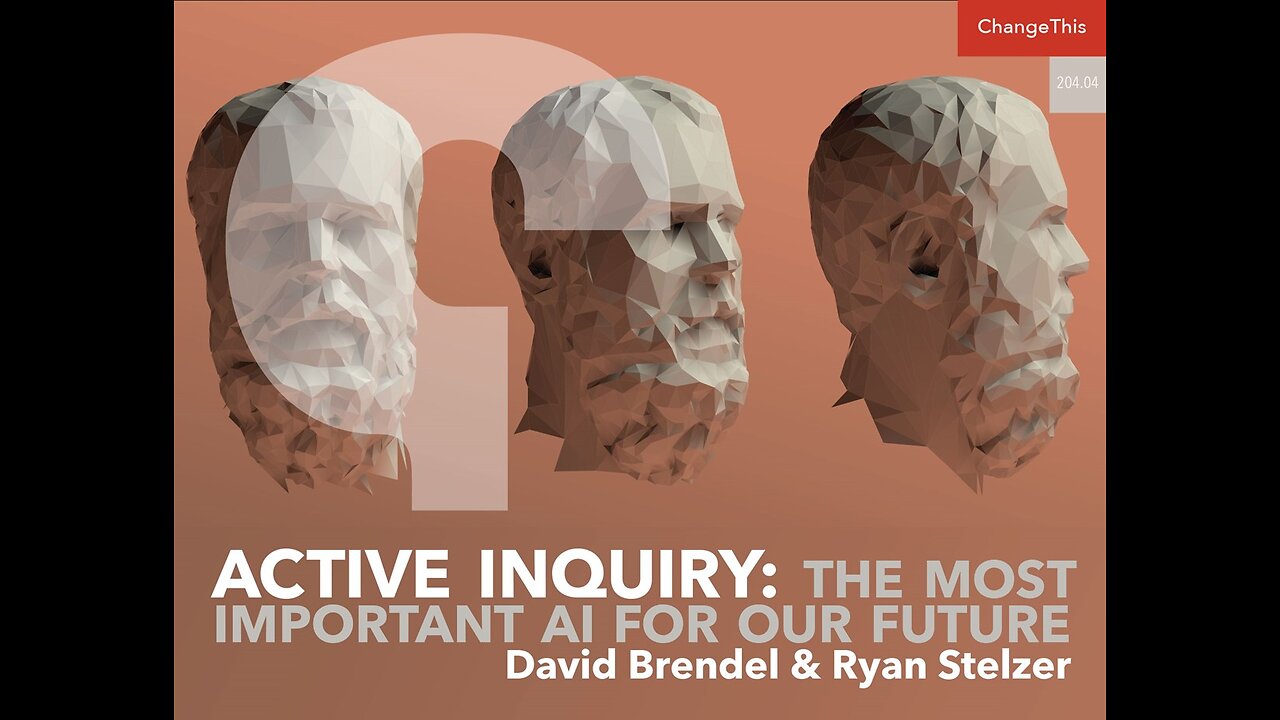Premium Only Content

The case for bottom-up AI - Al Jazeera English
🥇 Bonuses, Promotions, and the Best Online Casino Reviews you can trust: https://bit.ly/BigFunCasinoGame
The case for bottom-up AI - Al Jazeera English
ChatGPT and other generative artificial intelligence tools are rising in popularity. If you have ever used these tools, you might have realised that you are revealing your thoughts (and possibly emotions) through your questions and interactions with the AI platforms. You can therefore imagine the huge amount of data these AI tools are gathering and the patterns that they are able to extract from the way we think.
The impact of these business practices is crystal clear: a new AI economy is emerging through collecting, codifying, and monetising the patterns derived from our thoughts and feelings. Intrusions into our intimacy and cognition will be much greater than with existing social media and tech platforms.
We, therefore, risk becoming victims of “knowledge slavery” where corporate and/or government AI monopolies control our access to our knowledge.
Let us not permit this. We have “owned” our thinking patterns since time immemorial, we should also own those derived automatically via AI. And we can do it!
One way to ensure that we remain in control is through the development of bottom-up AI, which is both technically possible and ethically desirable. Bottom-up AI can emerge through an open source approach, with a focus on high-quality data.
Open source approach: The technical basis for bottom-up AI
Bottom-up AI challenges the dominant view that powerful AI platforms can be developed only by using big data, as is the case with ChatGPT, Bard, and other large language models (LLMs).
According to a leaked document from Google titled “We have no Moat, and Neither Does OpenAI”, open source AI could outcompete giant models such as ChatGPT.
As a matter of fact, it is already happening. Open source platforms Vicuna, Alpaca, and LLama are getting closer in quality to ChatGPT and Bard, the leading proprietary AI platforms, as illustrated below.
Open source solutions are also more cost-effective. According to Google’s leaked document: “They are doing things with $100 and 13B params that we struggle with at $10M and 540B. And they are doing so in weeks, not months.”
Open source solutions are also faster, more modular, and greener in the sense that they demand less energy for data processing.
High-quality data: The fuel for bottom-up AI
As algorithms for bottom-up AI become increasingly available, the focus is shifting to ensuring higher quality of data. Currently, the algorithms are fine-tuned mainly manually through data labelling performed mainly in low-cost English-speaking countries such as India and Kenya. For example, ChatGPT datasets are annotated in Kenya. This practice is not sustainable as it raises many questions related to labour law and data protection. It also cannot provide in-depth expertise, which is critical for the development of new AI systems.
At Diplo, the organisation I lead, we have been successfully experimenting with an approach that integrates data labelling into our daily operations, from research to training and management. Analogous to yellow markers and post-its, we annotate text digitally as we run courses, conduct research or develop projects. Through interactions around text, we gradually build bottom-up AI.
The main barrier in this bottom-up process is not technology but cognitive habits that often favour control over knowledge and information sharing. Based on our experience at Diplo, by sharing thoughts and opinions on the same texts and issues, we gradually increase cognitive proximity not only among us colleagues as humans, but also between us humans and AI algorithms. This way, while building bottom-up AI, we have also nurtured a new type of organisation which is not only accommodating the use of AI but also changing the way we work together.
How will bottom-up AI affect AI governance?
ChatGPT triggered major governance fears, including a call by Elon Musk, Yuval Harari and thousands of leading scientists to pause AI development on account of big AI models triggering major risks for society, including high concentrations of market, cognitive, and societal power. Most of these fears and concerns could be addressed by bottom-up AI, which returns AI to citizens and communities.
By fostering bottom-up AI, many governance problems triggered by ChatGPT might be resolved through the mere prevention of data and knowledge monopolies. We will b...
-
 15:54
15:54
Lacey Mae ASMR
10 hours ago $0.55 earnedASMR For Sleep in 15 Minutes!
5.99K4 -
 3:16:38
3:16:38
Price of Reason
10 hours agoTrump FIRES Fed Governor Lisa Cook! Cracker Barrel CRISIS Continues! James Gunn DCU Woes! Gamescon!
106K7 -
 2:25:01
2:25:01
FreshandFit
5 hours agoTyreek Hill Pays Ex Wife $1 Million in Ongoing Fees From Divorce?!
30.5K3 -
 2:03:46
2:03:46
Inverted World Live
7 hours agoHaunted Dolls Hack Amazon Alexa | Ep. 98
104K2 -
 3:09:53
3:09:53
Laura Loomer
7 hours agoEP140: Loomer EXPOSES Islamification At US State Department
33.6K12 -
 3:05:00
3:05:00
TimcastIRL
7 hours agoTrump Floats Accepting 600,000 Chinese Student Visas, MAGA Uproar | Timcast IRL
209K142 -
 8:44:47
8:44:47
SpartakusLIVE
13 hours ago$20,000 Hide and Seek Tourney w/ Stonemountain64 || #1 Rat wins the BIG CHEESE
69.9K -
 2:34:02
2:34:02
Barry Cunningham
8 hours agoLISA COOK | ADAM SCHIFF | LETITIA JAMES | ARE THEY BEING SACRIFICED BY THE DEEP STATE?
102K54 -
 1:36:19
1:36:19
Flyover Conservatives
16 hours agoOnly 17% of Millennials Hit These 5 Adult Milestones—Why?; What If Childhood Trauma Is Behind Your Health Problems? - Dr. Troy Spurrill | FOC Show
40.4K4 -
 4:49:04
4:49:04
HogansAlleyHero
18 hours ago💥CHASING DOPAMINE💥✅TRUMP SAYS BATTLEFIELD IS THE BEST✅
51.8K3